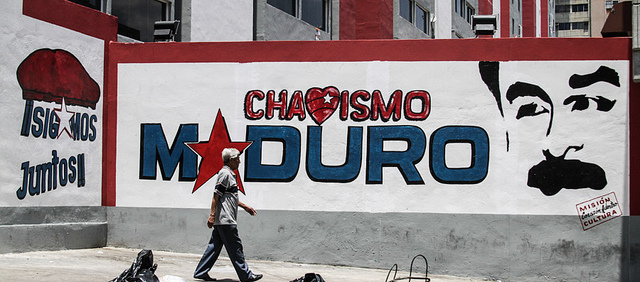Venezuela’s international debt issued in hard currency has increasingly been under selling pressure in disappointment with the governments half hearted attempt to reform the hopelessly ineffective and intransparent currency regime (that includes three official FX rates) as well as President Maduro’s decision to let Rafael Ramirez become Political Vice President and release him from his hitherto duties as Economic Vice President, PDVSA President and Oil and Mining Minister. In his role as Economic Vice President Rafael Ramirez was widely respected as the longest serving cabinet member under Hugo Chavez and as one of a very few pragmatic and reform friendly politicians in the current administration. Global Evolution, an asset management firm specialized in emerging and frontier markets debt, has published a piece of research discussing theses topics.
Should Venezuela default?
Adding fuel to the fire, an article, named ‘Should Venezuela Default?‘, written by two respected Venezuelan economists, Ricardo Hausmann and Miquel Angel Santos, was published at the beginning of September, basically asking if not Venezuela should default on its foreign debt instead of letting its population down by defaulting on food imports, lifesaving drugs imports, transport and services etc. The fact that Ricardo Hausmann is a former minister of planning of Venezuela and former Chief Economist of the Inter-American Development Bank, whereas Miguel Angel Santos is a senior research fellow at Harvard’s Center for International Development explains why the article has been subject to intense focus and discussions.
The economic regime is a run down mess
According to Banco Central de Venezuela real GDP growth was running around 1% YoY in Q4 2013 while inflation has risen sharply since early 2013; from around 20% to more than 63%. In this environment of runaway inflation, price controls are common with some prices remaining fixed for several years and with gasoline being the most extreme example, being fixed for 18 years. Needless to say, a 18 years price fix on gasoline is fiscally costly and has discouraged any attempt on fuel efficiency. Anecdotally, when Global Evolution was on a trip to Venezuela in October 2013, (driving a V8 four-wheel drive SUV) filled up the fuel tank for USD 1.
The bright spots in the economy
The oil export, the current account balance together with a fairly low public debt stock and a benign foreign debt to GDP ratio are the bright spots of Venezuela’s economy. Whereas the economy and the Venezuelan society may well implode if allowed to deteriorate further over the next decade, Global Evolution has no doubt that the sovereign has the capacity to service its external debt in the coming 2-5 years.
Maduro would do Venezuela a disservice by turning his back on international investors
What the article from Hausmann and Santos questions is the willingness to pay and in this respect Venezuela has a very good track record. Of course, things may look different under President Maduro, but with oil production running at 2.5mn barrels per day and proven reserves that holds the potential to raise production to at least 4mn barrels per day (6mn in a best-case scenario) if investments are made, Maduro would logically have little incentive to turn his back on the international capital market since international investors – be it foreign direct investors or portfolio investors – would be the ones to fund PDVSA’s production expansion and the subsequent increase in hard currency earnings. Currently, at face value, Venezuela’s oil exports generate annual hard currency earnings close to USD 100bn. However, when discounted for export financing to Petrocaribe (see below) and earnings used for the repayment of the debt to China, Venezuela’s crude export generates a still sizeable USD 70bn per year.
Low hanging fruits
Given the relative benign debt servicing cost on Venezuela’s sovereign debt in hard currency and the international debt of state owned oil company PDVSA (on average a total around USD 12.5bn per year over the next 10 years), a debt default would not free up much money in a broader perspective. Instead of running the risk of being excluded from international capital markets for years, the government could pick up low hanging fruits such as the heavily subsidized Petrocaribe solidarity program in which Venezuela basically finance the purchase of crude oil for 17 Caribbean countries. If Venezuela sold oil to these countries at market prices this would easily pay for the bond maturities of both Venezuelan sovereign bonds, the bonds issued by state owned oil company PDVSA and US based PDVSA owned refinery and retail gas station chain, CITGO.
Conclusion
Venezuela is one of the few net international creditors in the World with a current account surplus, high per capita income and low levels of external debt relative to peers, so from that perspective it does not immediately appear a high risk credit. Global Evolution does not view Venezuela as a likely default candidate in the near future and expects it to continue to service its debt. Should President Maduro choose to default on Venezuela’s sovereign debt it would be purely a populist ideological decision that would do little to help the Venezuelan people or economy in the medium to longer term perspective.
Venezuela is now yielding significantly above Ecuador that chose to default on part of its sovereign debt as recently as in 2009 and above Ukraine, a country at war, in severe economic contraction and with a much less sustainable debt situation. Global Evolution is aware of the challenges facing Venezuela and remains cautious on several fronts, but all things considered, current market levels appear attractive given the risks involved.
Global Evolution, an asset management firm specialized in emerging and frontier markets debt, is represented by Capital Strategies in the Americas Region.
